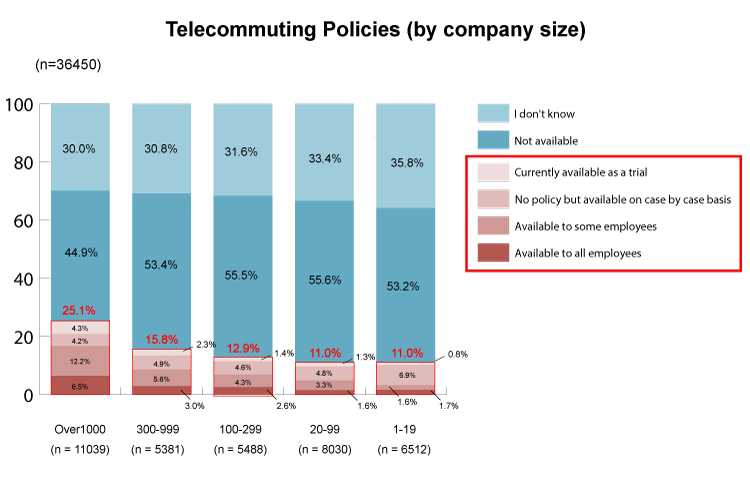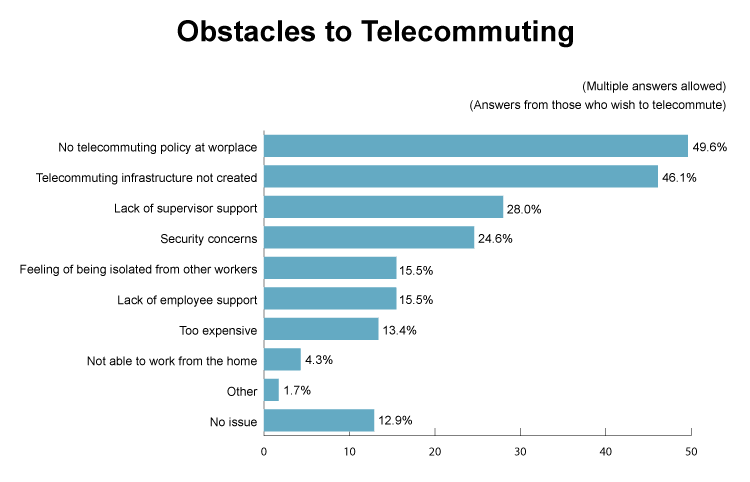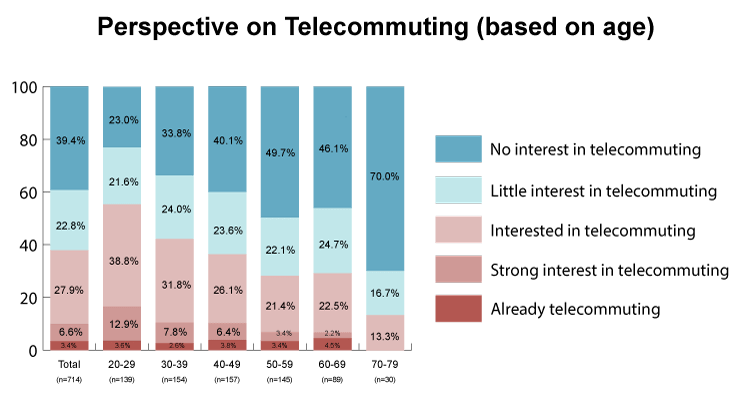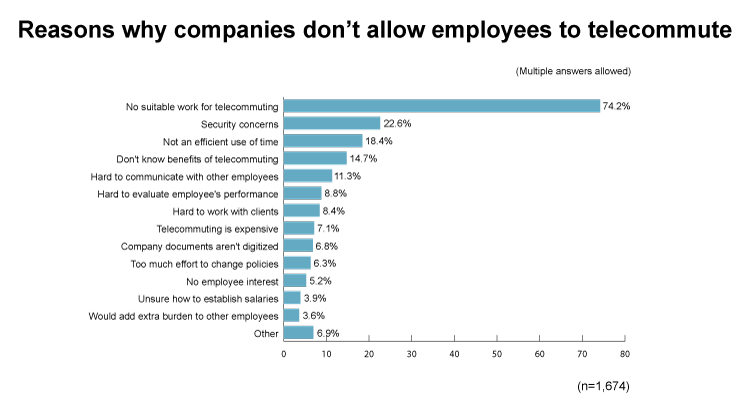
Btrax Design Company > Freshtrax > Telecommuting i...
Telecommuting in Japan: Growing Demand for Online Conferencing Software
Telecommuting, a working style that allows employees to work remotely, is no longer a new concept in the United States. According to OwlLab, 52% of employees in the United States work remotely at least once a week. However, that’s not the case in Japan. According to research conducted by the Japanese Ministry of Internal Affairs and Communications, only 13.3% of the respondent companies allow employees to telecommute and only 8.2% of employees have telecommuted before.
On the other hand, a good portion of working people in Japan is aware of the idea of telecommuting. Actually, 62.2% of people know about telecommuting, which is an increase from 53.3% in 2016, with 49.5% of employees being interested in taking advantage of telecommuting policies.
These results suggest two important insights. First, Japanese companies are still hesitant to introduce a work-from-home policy. Second, there is a lot of opportunity for companies in the video communications market, business chat tools market, and other similar businesses to grow in Japan. That is if they can convince hesitant Japanese companies to adopt new work from home policies. Sounds exciting, right?
First, we’ll explore insights on telecommuting in Japan. Then, we’ll share our top tips on how you can make your way into the Japanese market as a video conferencing or business chat tool company.
How the toxic work culture in Japan is changing
Japan has been notorious for toxic and unproductive work environments for a long time. Maybe you remember the tragedy of a 24-year-old employee from Dentsu, one of the top advertising agencies in Japan, who killed herself in 2016 because of stress from overworking and harassment in the workplace. That’s just one example of the effects of the negative work culture.
To add to that, Japan’s labor productivity levels have been historically low. According to OECD, the country’s output value per working hour is $47.50, which is only two-thirds of America’s. Also, Japan ranks at the bottom when compared to other G7 countries.
However, the work environment in Japan has finally started to change. “働き方改革” (Hatarakikata-kaikaku), which means work style reformation in Japanese, is a slogan focused on improving the way Japanese people work, and it’s becoming a social norm. Also, in 2018, the “Work Style Reform Law” was passed and several provisions took effect in April of 2019.
Many problems with the Japanese work environment are interconnected. While it won’t be easy to solve, the Japanese government is very serious about tackling work environment issues because Japan is facing a severe labor shortage.
The government’s big hope for telecommuting
The Japanese government is proactively promoting “Tele-work”, which means telecommuting in Japanese, to try to solve some of the work environment issues. For example, from July 22nd to September 6th, the government is conducting a nationwide campaign called “Tele-work day” to encourage employers to let their employees work remotely. The government is expecting more than 600,000 people to telecommute during the campaign period.
We hope that the campaign is successful, but since it will still be going on when we publish this article, we don’t yet know the results. So, let’s explore the most recent research and data regarding telecommuting in Japan to understand the reality and underlying problems behind it.
The reality of telecommuting in Japan
Only 3.4% of employers have a telecommuting policy
According to research conducted by the Ministry of Land, Infrastructure, Transport, and Tourism (MLIT), 16% of respondent employees answered that their employers allow employees to telecommute while 51.6% answered that their employers don’t allow working remotely. Only 3.4% of employers have a telecommuting policy that applies to all of their employees. Others either only permit a limited number of employees to work remotely or grant privileges day-to-day basis with supervisor approval.
Also, we found it interesting that 32.2% of respondents don’t know if their company has a telecommuting policy. It appears that Japanese companies may need better internal marketing practices or more communication about their HR policies, especially if they do allow employees to work remotely.
 Source: MLIT, 2017
Source: MLIT, 2017
The larger the company, the more likely it will adopt telecommuting policies
Normally, the decision-making process and changing corporate policies take longer for larger organizations, so we would expect that it’s easier for smaller organizations to adopt new work styles. However, the results below show that larger companies are more likely to adopt new work styles. As you can see in the graph below, 25.1% of companies with more than 1,000 employees allow employees to work remotely while only 11.0% of companies with less than 19 employees do so. While a quarter of larger companies allow employees to telecommute based on special cases or under a trial period, only 16.7% actually have an established telecommuting policy.
Similarly to the data we mentioned in the section above, 30% of respondents don’t know if their company has a telecommuting policy, regardless of company size. Again, companies need to communicate better with their employees about telecommuting policies.
 Source: MLIT, 2017
Source: MLIT, 2017
3 reasons hindering companies from adopting telecommuting policies in Japan
Although many workers are interested in telecommuting, as we’ve seen from above, many companies have not adopted telecommuting policies. This is especially the case with smaller organizations. Let’s find out the obstacles preventing companies from adopting telecommuting policies.
1) An infrastructure supporting telecommuting has not been established
According to responses from employees who wish to telecommute but have not done so yet, the two main reasons they haven’t been is because employers have not yet established a telecommuting policy and the necessary infrastructure for telecommuting has not been created.
 Source: MIC, 2017
Source: MIC, 2017
2) Employees care too much about what others will think
Many respondents from the survey from the same employees mentioned above answered that they can’t get support or understanding from their supervisors and/or coworkers. As you can see in the chart below, the majority of the older generation are very negative about telecommuting.
 Source: MIC, 2017
Source: MIC, 2017
It’s common that the Japanese want to maintain harmony in the office as it is an important part of business culture in Japan. With the idea of maintaining harmony in mind, it becomes difficult to implement new work styles such as telecommuting because employers are concerned that conflict will arise. For example, they are concerned that employees will think it is unfair that specific people will be able to telecommute when others cannot or some employees.
3) Employers have security concerns
Employers are hesitant to allow telecommuting because they are concerned about proprietary information leaks. The surveys shared above show that 24.6% of employees said that information security was a reason why their companies were not able to adopt telecommuting practices. As you can see in the chart below, 22.6% of companies don’t introduce telecommuting because they worry about information being leaked as well.
 Source: MIC, 2017.
Source: MIC, 2017.
High demand for video conferencing tools
That fact that only 13.3% of Japanese companies have adopted telecommuting policies means that there is a lot of potential for new businesses to educate companies on the benefits of telecommuting and introduce solutions that can help connect employees with their colleagues and clients.
According to a survey conducted by the Japanese Ministry of Internal Affairs and Communications, video conferencing tools are used the most, followed by business chat tools, to improve communication between employees who work in the company office and those who work remotely.
 Source: MIC, 2017.
Source: MIC, 2017.
According to Seed Planning, the market size of the web conference tools in 2018 was estimated at $478 million USD (1 USD = 105 JPY, as of Aug. 9, 2019), which was a 2% increase from 2017.
 Source: Seed Planning
Source: Seed Planning
The video conferencing tools market size has been growing since 2011 and this trend is expected to continue. The US-based video conference tool giant, Zoom, recently announced that it plans to double the number of employees in Japan to accelerate its business there. As of July 2019, it’s reported that more than 2,000 Japanese companies use Zoom’s paid service and over 100 new companies are signing up for their paid service every month.
Takeaways: 3 ways to convince Japanese companies to adopt telecommuting
While there is a growing demand for services to facilitate telecommuting in Japan, you now know that there are both technical and cultural challenges that make it difficult for Japanese companies to adopt telecommuting practices. The key to customer acquisition is to help Japanese companies adapt to changes in work styles. Here are some ways to approach Japanese companies and build trust:
1) Educate the older generation
First things first, we need to change people’s mindsets. The majority of decision-makers in companies tend to be older employees who are not supportive of telecommuting. Changing their mindset is not easy, but the extra effort to educate them on the benefits of telecommuting while addressing their concerns is worth it. A separate content strategy that will cater to the older generation of decision-makers may be needed.
The number one reason companies don’t adopt telecommuting policies is that they don’t think work can be done remotely. Traditional Japanese business practice requires a lot of physical interaction like getting handwritten signatures from all of the stakeholders for project approval or preparing physical presentation decks for meetings. By showcasing case studies of how much work can get done without everyday in-person interaction will help change conventional mindsets.
Last, but not least, emphasize security. Security concerns may be caused by uncertainty or lack of knowledge and by addressing how your company protects information will help skeptical companies feel more comfortable with telecommuting.
2) Make the tools affordable and easy to install for small businesses
Smaller organizations are less likely to adopt telecommuting policies because of potential costs to implement. For example, V-Cute, the company with the highest market share for online meeting tools, provides a tool in Japan that costs roughly $500 per meeting room. However, as you know, many global companies that offer more affordable options. (*Wink wink* I’m talking about your service!)
In addition, smaller organizations typically do not have an IT department. So the installment has to be easy or ideally, require no special installations.
3) Share case studies to show adoption and different telecommuting policies
Do you remember how we mentioned that more than 30% of employees don’t know if their employers have a telecommuting policy? Some employers may have not established a policy yet while others may not communicate the policy to their employees well.
Since many more companies in the U.S. have telecommuting policies, you can share successful case studies with your potential clients. Although the U.S. and Japan have different labor laws and business practices, the success and experience of other companies will be very helpful for Japanese companies in deciding how to create telecommuting policies.
#####
With workstyles changing in Japan, there are great business opportunities available in the telecommuting space. Entering the Japanese market when the business practices differ will not be easy but as you can see, there’s a desire for change and the timing may be right. The key to success is localizing your value proposition so that users understand the benefits you provide while also taking into consideration the social norms of Japanese society.
For over 15 years, btrax has been helping global brands expand their businesses into the Japanese market. We are excited to work with companies working to improve employee work lives and making companies more efficient. If that’s you, please contact us to discuss how we can work together.
Did you enjoy our article? Subscribe to our newsletter to get our latest articles in your inbox!







